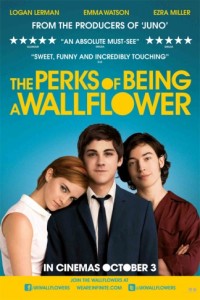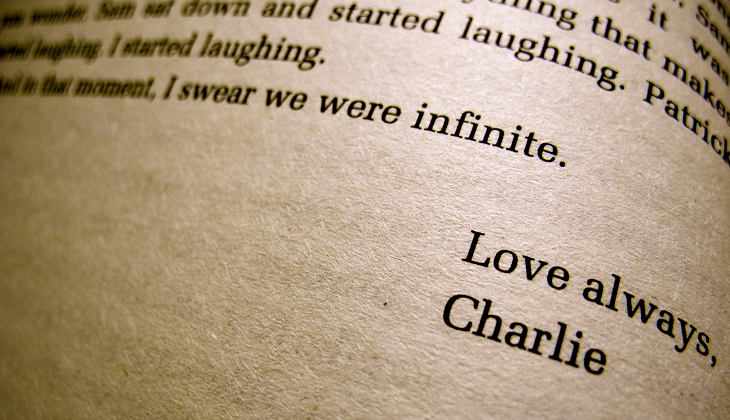 The Perks of Being a Wallflower is a deeply flawed novel. The central high school romance, between a gawky freshman guy and a popular senior girl, is implausible wish-fulfillment. Its conflicts are often short and choppy, and the plot is driven by a laundry list of hot-button adolescence issues: suicide, abuse, drugs, closeted homosexuality, etc. The book’s closing twist collapses under any level of scrutiny, and protagonist Charlie can be too quirky, even neurotic.
The Perks of Being a Wallflower is a deeply flawed novel. The central high school romance, between a gawky freshman guy and a popular senior girl, is implausible wish-fulfillment. Its conflicts are often short and choppy, and the plot is driven by a laundry list of hot-button adolescence issues: suicide, abuse, drugs, closeted homosexuality, etc. The book’s closing twist collapses under any level of scrutiny, and protagonist Charlie can be too quirky, even neurotic.
But The Perks of Being a Wallflower is also marvelous, one of my favorite books and stories. It’s full of fantastic characters who feel less like plot-driven sketches and more like multi-dimensional humans, full of agency and complexity. There are so many beautiful or heart-wrenching scenes. I can’t stop reading as soon as I start reading.
Perks is an epistolary novel, told entirely through letters written by Charlie to an unknown person at his school. The book spans Charlie’s freshman year in high school as he develops a friendship with two seniors, Sam and Patrick. Charlie describes his attempt to come out of his shell and live less passively. The epilogue also points out an additional arc that spans the novel, but I won’t spoil it right here.
The biggest strength of Perks is its remarkable narrator, Charlie. He’s the most interesting young adult novel narrator since Holden Caulfield, with a huge heart and an insatiable curiosity.
Charlie and his friends go through many trials in the year that Perks’ plot covers, and the major thing he learns about life is simple:
Enjoy it. Because it’s happening.
But there’s so much more to it than an easy moral. The joy of The Perks of Being a Wallflower is the sense of discovery and wonderment and affection that drives Charlie. It’s so intriguing that you never want to put the book down. Wonderful scenes like Christmas with Sam and Patrick, and a drive through a tunnel, and a game of truth or dare become unforgettable as recounted by Charlie.
The “authenticity” of the book is slightly hampered by the culture shoehorned in to the book: Charlie recites a bullet point list of ‘80s songs he loves. Much text is devoted to summarizing novels assigned by Charlie’s teacher (who seems to be a stand-in for Chbosky).
Still, this isn’t all bad in the context of a high school student. I know that there were a handful of songs that defined my high school years, and I think many high school students feel the same way. Sometimes just listing culture that’s important to us captures the feeling of a time period better than anything else possibly could.
(Plus, the songs chosen are so perfect. It’s hard to imagine a song more closely matching the feeling of this book than the oft-mentioned “Asleep” by The Smiths. And some of the other songs — “Scarborough Fair,” “Vapour Trail” — are just as spot-on.)
Chbosky uses so many tropes of high school stories are used — first love, accidental ingestion of drugs, stressful holidays, acting in a play, wacky best friend, love triangle — but filtered through Charlie’s words, every moment and twist feels fresh and exciting.
A sense of lost innocence permeates the novel. Charlie observes with anger and sadness the destructive nature of adolescence. And as he becomes a more active character — less of a wallflower — we start to get more of a lens into guilt and trauma from Charlie’s past.
As much as I ended up loving Charlie’s narration, it actually put me off of Perks at first. I actually tried to start the book a few times, but Charlie’s plainness when talking about topics like teenage sexuality and suicide put me off. It was only on my third try that I made it to the second letter, and by then I was hooked.
It’s hard to think of a more tender, engaging coming of age story than The Perks of Being a Wallflower, and I highly recommend giving it a shot if you have a stomach for teenage drama.
 Before I wrap up, I want to briefly discuss the movie. Chbosky, the book’s author, both wrote the screenplay and directed the film, so there’s not much room to say “that’s not how it should have happened.” But still… that’s not how it should have happened. Most of the movie is faithful on a plot level, but the soul of the book — the world filtered through Charlie’s voice — is greatly diminished.
Before I wrap up, I want to briefly discuss the movie. Chbosky, the book’s author, both wrote the screenplay and directed the film, so there’s not much room to say “that’s not how it should have happened.” But still… that’s not how it should have happened. Most of the movie is faithful on a plot level, but the soul of the book — the world filtered through Charlie’s voice — is greatly diminished.
Logan Lerman and Emma Watson do their best, but both feel miscast. (Ezra Miller is astoundingly perfect as Patrick, though.) Watson’s attempt to hide her accent is distracting the entire movie.
There are a few things the movie does that a novel can’t: The music works wonderfully in the movie — obviously moreso than in the book, which can only list titles. (“Heroes” is the best possible tunnel song, even if it’s not the one used in the novel.) Lerman’s Charlie is more of a traditional “sensitive good guy” than in the book, which makes the story less unique.
It’s largely an enjoyable movie, but the story’s more trite and formulaic moments stand out. Unlike The Spectacular Now and It’s Kind of a Funny Story, this is a YA book that you’re better off leaving in print.






Hold up, this book references “Vapour Trail?!” /adds to list.
I think anyone coulda told you Emma was miscast before even seeing the movie. Still love you, Emma.
I will say that the trailer for the movie is great.
Pingback: Review: Love Letters to the Dead by Ava Dellaira